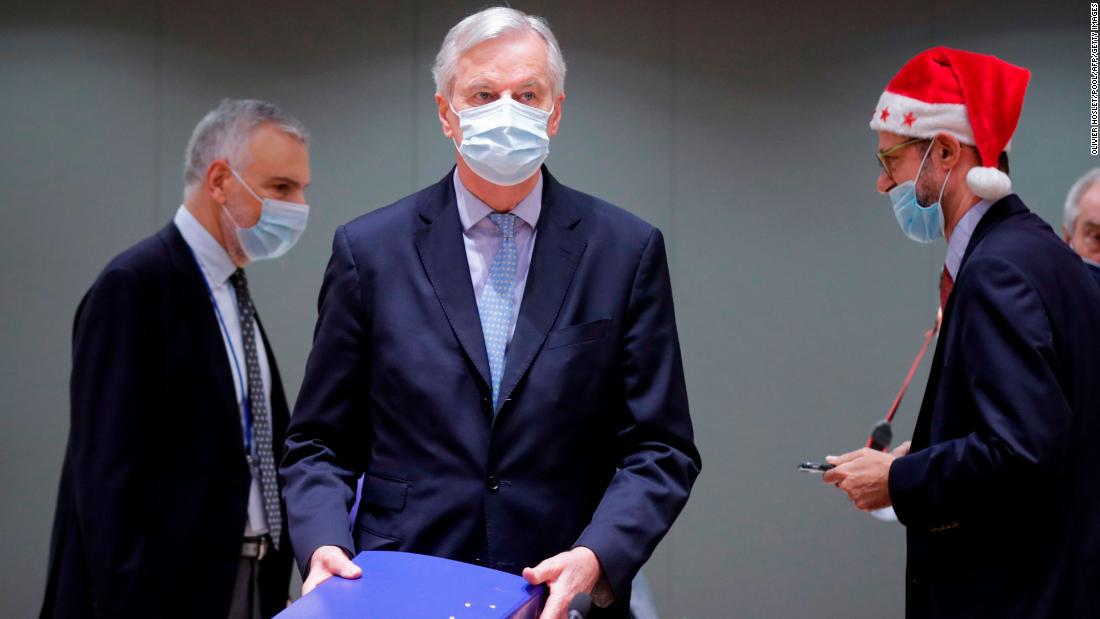The EU’s chief negotiator, Michel Barnier, will inform the Permanent Representatives Committee (COREPER), made up of ambassadors from EU countries, about the agreement, which was finalized on Thursday, more than four years after the United Kingdom voted. for leaving the EU.
The deal was closed after months of tense negotiations and a few days before the December 31 deadline, which marks the end of the Brexit transition period.
EU leaders, the European Parliament and the UK Parliament, all now need to approve the agreement on their own.
British lawmakers will debate the legislation on December 30. The opposition Labor Party said it would support the government’s agreement.
All EU member states have signed the agreement, after which it will return to the European Parliament, where members will vote to ratify the agreement.
The European Parliament said it was too late to hold an emergency vote before 31 December.
Instead, they plan to apply the EU-UK agreement “provisionally”, with members of the European Parliament (MEPs) formally meeting to ratify the agreement in the New Year. Parliament will meet on December 28 to discuss the Christmas Eve deal.
Key business points
- Zero tariffs and quotas on goods
- End of freedom of movement, which means that UK citizens will no longer have the right to work, live, study or start a business in the EU without a visa
- Border controls will be applied between the UK and EU member states
- There will be no rigid border on the island of Ireland between the Republic of Ireland and Northern Ireland
- The United Kingdom may continue to develop British fishing activities for at least 5 ½ years, during which time European fishing communities will be protected
- A shared commitment to protect the environment, fight climate change and carbon pricing
- A shared commitment to the protection of social and labor rights
- Maintain standards of tax transparency
- Transport and passenger rights in the transport sector
- The UK’s continued participation in a number of EU programs until 2027, such as Horizon Europe, subject to a UK financial contribution
Speaking shortly after Thursday’s announcement, UK Prime Minister Boris Johnson said the deal was a “good deal” for “the whole of Europe” – one that meant “new stability and new certainty in the which has sometimes been a conflict and difficult relationship. “
Echoing the nationalist rhetoric that was so prominent in the Brexit referendum campaign, he said: “We have returned control of our laws and our destiny … as of January 1, we are out of the customs union and the single market; British laws will be made exclusively by the British parliament, interpreted by UK judges in UK courts; and the jurisdiction of the European Court of Justice will come to an end. “
Johnson said the UK reached a £ 660 billion ($ 893 billion) trade agreement “Canada-style” and addressed the fisheries agreement – a key point of contention in the negotiations – saying the UK had “total control” of its waters was removed.
European Commission President Ursula von der Leyen said the EU has reached a fair and balanced post-Brexit trade agreement, but has signaled that the bloc has the advantage in the negotiations.
“As we knew, in any case, if there had been a tough Brexit, it would not have been good for both sides, but it would have hit the UK stronger than the European Union with all its power of 450 million citizens. And therefore, from a position of strength, we were able to present the most comprehensive agreement we have ever had, “von der Leyen told a news conference on Thursday.
“So, to all Europeans, I say it’s time to leave Brexit behind – our future is made in Europe.”
Luke McGee and Kara Fox contributed to this story.
